Dragon Con 2017 Panel Report: Game of Toxic Masculinity, Part 2
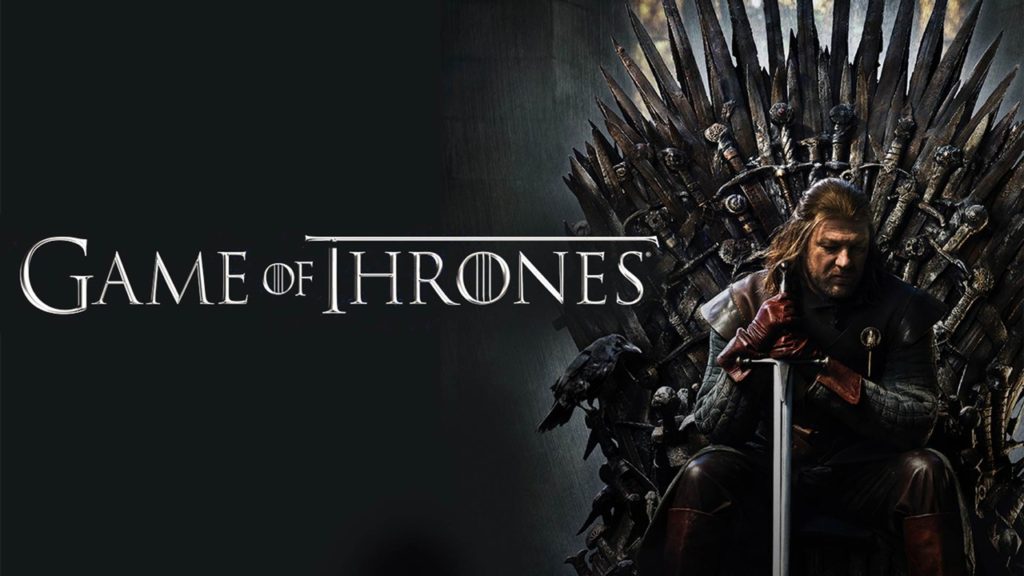
Part one of my “Game of Toxic Masculinity” panel report from Dragon Con 2017 wrapped up with a discussion of show runners Benioff and Weiss and how their own toxic masculinity effects the series. In that discussion I touched on Loras and how they portrayed his sexuality, and so I’ll begin part two by exploring the toxic way Game of Thrones portrays the sexuality of queer characters in general.
One of the general grievances with Game of Thrones is how the show deals with queer characters. Not just Renly and Loras, as mentioned in part one, but also many of the Dornish. As my fellow panelist Andrew pointed out, Dorne in the TV show is dealt with in a completely negligent manner. Oberyn was probably the one who was portrayed fairly well in terms of his open-mindedness and sexuality, but the rest of the Dornish were nothing more than tropes. Of course Oberyn is long gone, but the writers certainly had the ability to give us Ellaria as a well-written queer character…provided that they took a step back from the way she was written in her earliest episodes, that is. Unfortunately, they did nothing of the sort, which proves yet again that the toxic masculinity is strong in the people who head up this show. Ellaria turned into one of those aforementioned tropes, and by show standards all of Dorne disappeared along with her and her equally trope-y Sand Snake daughters.
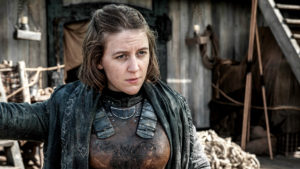 As for any other remaining queer characters in the show, we really only know of Yara Greyjoy, so I was happy when one of our well-spoken audience members asked us what we thought about her. It was noted that she is a woman who wants to rule from the Seastone Chair, and we also know that she was raised in an extremely toxic household. The difference between her and, say, Cersei, is that all of her brothers were dead or gone, so her father Balon essentially raised her as a son, presumably to replace the ones he’d lost. In many ways, she fills what are considered traditional male roles, but she also has plenty of characteristics that are traditionally considered feminine. All that said, Yara Greyjoy is quite a bit different from Asha Greyjoy – as this audience member noted, she really connected with Asha as a character, but doesn’t feel the same way about show counterpart Yara. And why is that?
As for any other remaining queer characters in the show, we really only know of Yara Greyjoy, so I was happy when one of our well-spoken audience members asked us what we thought about her. It was noted that she is a woman who wants to rule from the Seastone Chair, and we also know that she was raised in an extremely toxic household. The difference between her and, say, Cersei, is that all of her brothers were dead or gone, so her father Balon essentially raised her as a son, presumably to replace the ones he’d lost. In many ways, she fills what are considered traditional male roles, but she also has plenty of characteristics that are traditionally considered feminine. All that said, Yara Greyjoy is quite a bit different from Asha Greyjoy – as this audience member noted, she really connected with Asha as a character, but doesn’t feel the same way about show counterpart Yara. And why is that?
Well, it all goes back to the Game of Toxic Masculinity, of course! (And yes, I’m still focusing – for the most part – on how the show runners’ toxic masculinity has negatively effected the series…sorry not sorry.) Billy commented that he thinks Asha/Yara is set up to be a sort of foil to Cersei. Maybe it’s intentional, maybe it’s not; regardless, Asha is confident and a great leader, yet she truly is held back because she is a woman. She’s truly an awesome character, and yet none of this was sacred when she was written as Yara, who seems to exist as part of Theon’s plot line and nothing more. Well, that, and she’s constantly flirting with and/or making out with other women.
Now I of all people don’t have a problem with the idea of Yara being queer. In fact, Asha may be as well, for all we know – just because Martin didn’t write any specific scenes that show this, she boasts a healthy sexuality and certainly could have had relations/relationships with women in the past (and might in the future – there are still two books left, after all). Unfortunately, as I’ve already discussed, Benioff and Weiss do not know how to portray proper queer representation. I believe they want everyone to applaud their decision to write Yara as a lesbian because they don’t understand that having representation and having good representation don’t go hand-in-hand, and because of their own flawed reasoning they remain two dudes writing a scene about, say, two drunk girls they saw making out back in college.
The TL;DR is that Asha is a complete character with her own motivations and agency while Yara is merely an accessory to Theon’s plot with the ‘added bonus’ that sometimes she ‘gets to’ titillate the audience. On top of that, despite the fact that Theon is off to rescue her from Euron, we don’t know that she is still alive, and if I was a betting person, I’d wager that she won’t live out the series. I believe this in part because the writers have systematically eliminated every queer character in the story, and in part because I’m fairly certain that her death will be a refrigerator moment for Theon. After all, Benioff and Weiss have known for some time how Game of Thrones would end, and the chances of them taking a step back and viewing their writing from outside the game of toxic masculinity are basically nonexistent.
Listen, I’m not trying to say that the only reason toxic masculinity exists in this series is because of the way Benioff and Weiss choose to (insist on?) writing it. There are plenty of examples of toxic masculinity in the original text; the difference is that Martin has written, and is writing, a story that I believe seeks to overcome its downfalls. That said, I mentioned Cersei Lannister and how Asha seems to be a sort of foil to her, and it’s important to note that she is one of the best examples of toxic masculinity that originated in the books and has, for the most part, stayed relevant in the show.
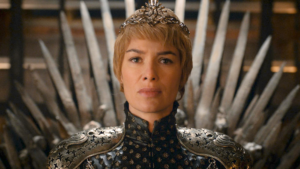 One of the things about Cersei that seems to fascinate people the most is her drive to be her father. She wants power and control and truly believes that she is stuck outside of the power cycle simply because she is a woman. Billy had a great observation about how Cersei’s motivations are (especially in the books) explicitly maternal, while her methods aren’t at all. Jenn then pointed out that Cersei is on the outside looking into the lives of men and interpreting the way they are able to live and the things they are able to do as freedom, all the while hating the constraints that her own gender places on her. She has to marry who she’s told to marry, she has to behave herself as a woman – there are generally just a lot of things that she isn’t allowed to do. Meanwhile, she sees the men in her life not having to deal with those constraints, and of course doesn’t understand that they have their own struggles. It’s very much a ‘the grass is always greener on the other side’ scenario.
One of the things about Cersei that seems to fascinate people the most is her drive to be her father. She wants power and control and truly believes that she is stuck outside of the power cycle simply because she is a woman. Billy had a great observation about how Cersei’s motivations are (especially in the books) explicitly maternal, while her methods aren’t at all. Jenn then pointed out that Cersei is on the outside looking into the lives of men and interpreting the way they are able to live and the things they are able to do as freedom, all the while hating the constraints that her own gender places on her. She has to marry who she’s told to marry, she has to behave herself as a woman – there are generally just a lot of things that she isn’t allowed to do. Meanwhile, she sees the men in her life not having to deal with those constraints, and of course doesn’t understand that they have their own struggles. It’s very much a ‘the grass is always greener on the other side’ scenario.
Additionally, Cersei is not a good queen/queen regent, but she completely believes that she is doing a great job of running things, and that the only reason people think she’s not doing a great job is because she’s a woman. It’s important to remind ourselves that Tywin didn’t teach Cersei how to be a leader, because she was his daughter, not his son. So Cersei only knew the legends, not the man, and yet she believes that as the daughter of Tywin Lannister, she is automatically good at ruling. Because of all this, she is sadly both a victim and perpetrator of the game of toxic masculinity.
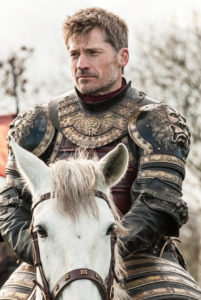 On the other Lannister hand, we have Jaime (ha, hand joke), who was of course raised to be the heir that Cersei wants to be and then gave that up so that he could remain close to his sister. And yet even though Jaime joined the Kingsguard for her, he still notes that it was the proudest moment of his life – until he found out how angry Tywin was about this choice. In a way this is the game of toxic masculinity at its finest; Jaime rightfully assumed that he would be praised for taking such a vaunted position, but instead he incurred his father’s wrath because doing so left Tywin without a proper heir (as Tyrion, being a dwarf and therefore only half a man, certainly didn’t count). Later, Jaime’s ideas of masculinity are more directly tested when he loses his hand. He has to learn how to re-define himself not just as a fighter but as a man, and because he actually works toward doing so, he has one of the best character arcs in the series.
On the other Lannister hand, we have Jaime (ha, hand joke), who was of course raised to be the heir that Cersei wants to be and then gave that up so that he could remain close to his sister. And yet even though Jaime joined the Kingsguard for her, he still notes that it was the proudest moment of his life – until he found out how angry Tywin was about this choice. In a way this is the game of toxic masculinity at its finest; Jaime rightfully assumed that he would be praised for taking such a vaunted position, but instead he incurred his father’s wrath because doing so left Tywin without a proper heir (as Tyrion, being a dwarf and therefore only half a man, certainly didn’t count). Later, Jaime’s ideas of masculinity are more directly tested when he loses his hand. He has to learn how to re-define himself not just as a fighter but as a man, and because he actually works toward doing so, he has one of the best character arcs in the series.
(Unfortunately, in the show Jaime is yet another victim of D&D. In this case, in their attempt to make Cersei a badass woman™, they basically dumped Jaime’s character arc into the trash. However, I suppose that is another story for another time.)
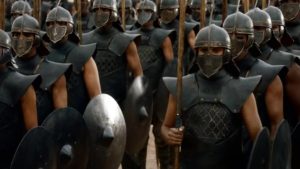 I could never fit everything we talked about in the Game of Toxic Masculinity panel into just two articles, but in part one I did mention that I would revisit some of our discussion on eunuchs. I was honestly surprised that several people in the audience brought up both Varys and the Unsullied, because while I do believe there are some observations to make about how they are affected by other characters’ toxic masculinity, in general they aren’t considered men or women – they are a thing apart. The Unsullied are thought of as mindless drones by everyone except the few who come to know some of them after Daenerys frees them; Varys, for his part, is the ‘Spider’, a sneaky animal weaving his web of whispers. The Unsullied are predictable, Varys is unpredictable, but they’re both considered alien, and yes, a lot of that has to do with the way the societies in the series view eunuchs…but we came to the conclusion that those views aren’t completely (or even mostly) based in toxic masculinity.
I could never fit everything we talked about in the Game of Toxic Masculinity panel into just two articles, but in part one I did mention that I would revisit some of our discussion on eunuchs. I was honestly surprised that several people in the audience brought up both Varys and the Unsullied, because while I do believe there are some observations to make about how they are affected by other characters’ toxic masculinity, in general they aren’t considered men or women – they are a thing apart. The Unsullied are thought of as mindless drones by everyone except the few who come to know some of them after Daenerys frees them; Varys, for his part, is the ‘Spider’, a sneaky animal weaving his web of whispers. The Unsullied are predictable, Varys is unpredictable, but they’re both considered alien, and yes, a lot of that has to do with the way the societies in the series view eunuchs…but we came to the conclusion that those views aren’t completely (or even mostly) based in toxic masculinity.
In conclusion, I suppose I have to admit that the show runners probably got one thing right – it’s very likely that at some point the women will be the ones who are truly running things (preferably in the end, ha). I just don’t agree with how the show has gotten to that point. For the better part of six seasons, we’ve had to suffer through example after example of D&D’s toxic masculinity, mostly in the form of rapes and attempted rapes. They made a lot of mistakes, and while seasons six and seven have clearly meant to make up for some of them, it still feels like way too little, way too late. Yes, there is rape that happens in the books, but Martin doesn’t make us read it, just like he didn’t make us read Theon’s torture. But D&D don’t know subtlety, so they threw these things in viewers faces, consistently using them as plot devices. Sure, they’ve stepped back from doing so, but they’ve stepped back because they always meant to step back, not because of the many, many complaints aired about their bad writing decisions. It was their narrative choice to no longer constantly throw these things in our faces, and they made that choice because they finally felt like they reached a point where they believe they no longer have to use rape as a plot device in order to show how bad things are in the world of GoT.
But guess what, guys, they never had to include all that nonsense in the first place. There are a thousand different ways they could have handled their version of this story, a thousand different ways that didn’t need to involve us having to watch these characters being raped and tortured episode after episode, season after season. As Andrew concluded, spectacle for the sake of spectacle is never really worth it…though sadly, for D&D and their Game of Thrones, it paid off.
And that’s where our “Game of Toxic Masculinity” panel wrapped up, though to be honest I’m sure we could have gone another hour if that time had been allotted to us! Again, I have to thank the High Fantasy track, my fellow panelists, and our awesome audience members for making this one of the best Dragon Con panels I’ve ever experienced!
Author: Tara Lynne
Tara Lynne is an author, fandom and geek culture expert, and public speaker. She founded Ice & Fire Con, the first ever Game of Thrones convention in the US, and now runs its parent company Saga Event Planning.
Help support independent journalism. Subscribe to our Patreon.
Copyright © The Geekiary
Do not copy our content in whole to other websites. If you are reading this anywhere besides TheGeekiary.com, it has been stolen.Read our


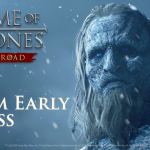
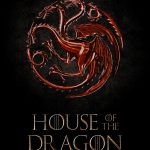

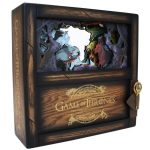

2 thoughts on “Dragon Con 2017 Panel Report: Game of Toxic Masculinity, Part 2”
Comments are closed.